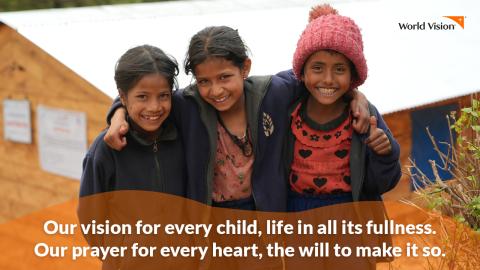
About Us
World Vision is a child-focused relief, development and advocacy organisation that has contributed to transformation in the lives of millions of children around the world in vulnerable situations. WV aspires to achieve this through partnership with local communities, civil societies, government and private sectors where we believe in mutual participation and trust, shared vision and goal, accountability and responsibility.
We are child-focused organisation driven by Christian values to serve children and families regardless of their religion, age, gender, ethnicity, class and caste. We believe that every child has equal rights as provisioned for in the United Nations Convention on the Rights of the Child and that their well-being and future concerns us all. This is central to our vision “life in all its fullness” for every child. This work cannot be achieved by us alone, so we collaborate and partner with multiple stakeholders who have common values of justice, love and hope. We firmly support the Universal Declaration of Human Rights, Humanitarian Principle, Red Cross Code of Conduct and Paris Principles.
World Vision in Nepal
World Vision International (WVI) Nepal is a part of the World Vision International global partnership operating in nearly 100 countries. WVI started its long-term development programme in Nepal since 2001 to contribute for well-being of children. At present, WVI Nepal has long-term development programmes in 17 districts, namely Udayapur, Sarlahi, Mahottari, Rautahat, Sindhuli, Kathmandu, Lalitpur, Lamjung, Jumla, Kailali, Kanchanpur, Achham, Doti, Dailekh, Jajarkot, Banke and Bajhang across seven provinces of Nepal.
World Vision International Nepal implements its country strategy of development, advocacy and disaster management programmes through integrated sectoral interventions with innovation in local communities and neighborhoods. The existing programmes are Inclusive & Quality Education (IQE), Protection & Community Engagement and Sponsorship Plan (PCESP) and Nutrition and Resilient Livelihoods (NRL) with Gender Equality and Social Inclusion (GESI) as crosscutting agenda contributing to the well-being of children. More than 50% of these programmes are long-term development programmes and are implemented for more than 10 years across the focus areas known as Area Programmes (AP).
Programme Partnership
World Vision believes that partnering with others is a key factor in bringing about lasting changes in communities. WVI Nepal partners with government, community groups, local NGOs and the private sectors. WVI Nepal adopts a multi-stakeholder approach to partnering, recognising that all of these different groups have an important role in creating sustainable change. The nature of partnering relationship varies depending on the issues being addressed, and the resources and capacity of different partners involved.
How we are accountable
World Vision is accountable to private and government donors, to public agencies charged with legal oversight, to our funding offices and to those whom we serve. Internal and external audits and evaluations are conducted regularly to ensure efficient and effective use of resources.
How we are funded
Guided by its global child sponsorship standards in maximizing child well-being from our programme, WVI Nepal works with WV’s global office, funding or support offices throughout the world and receives funding from individuals, foundations, corporations, multi-lateral agencies and governments.
Long term private funding commitment from individuals called child sponsors as well as funding commitments from corporates are our primary and predominant funding sources. We receive goods supported by private sector through our support offices and get institutional funding from multi-laterals and bi-lateral agencies as grants. Grants allow us to further deepen our impact among children, their families and their communities.
We work in accordance with our global financial and accountability standards and take the stewardship of the resources of our donors seriously. We set high standards of professional competence, best practices and financial accountability for what we do.